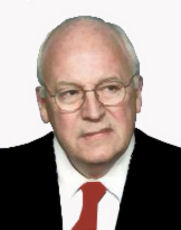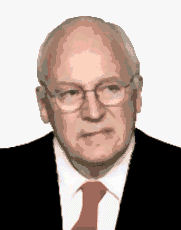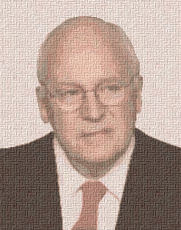I don’t seem to be able to stop posting articles about the recent developments about our Torture policy…
Dick Cheney keeps saying "enhanced interrogation" was used to stop imminent attacks, but evidence is mounting that the real reason was to invent evidence linking Saddam Hussein to al-Qaida.
Salon
By Joe Conason
May 14, 2009 | The single most pertinent question that Dick Cheney is never asked – at least not by the admiring interviewers he has encountered so far – is whether he, Donald Rumsfeld and George W. Bush used torture to justify the illegal invasion of Iraq. As he tours television studios, radio stations and conservative think tanks, the former vice-president hopes to persuade America that only waterboarding kept us safe for seven years.
Yet evidence is mounting that under Cheney’s direction, "enhanced interrogation" was not used exclusively to prevent imminent acts of terror or collect actionable intelligence – the aims that he constantly emphasizes – but to invent evidence that would link al-Qaida with Saddam Hussein and connect the late Iraqi dictator to the 9/11 attacks.
In one report after another, from journalists, former administration officials and Senate investigators, the same theme continues to emerge: Whenever a prisoner believed to possess any knowledge of al-Qaida’s operations or Iraqi intelligence came into American custody, CIA interrogators felt intense pressure from the Bush White House to produce evidence of an Iraq-Qaida relationship [which contradicted everything that U.S. intelligence and other experts knew about the enmity between Saddam’s Baath Party and Osama bin Laden’s jihadists]. Indeed, the futile quest for proof of that connection is the common thread running through the gruesome stories of torture from the Guantánamo detainee camp to Egyptian prisons to the CIA’s black sites in Thailand and elsewhere.
Perhaps the sharpest rebuke to Cheney’s assertions has come from Lawrence Wilkerson, the retired Army colonel and former senior State Department aide to Colin Powell, who says bluntly that when the administration first authorized "harsh interrogation" during the spring of 2002, "its principal priority for intelligence was not aimed at pre-empting another terrorist attack on the U.S. but discovering a smoking gun linking Iraq and al-Qaida."
In an essay that first appeared on the Washington Note blog, Wilkerson says that even when the interrogators of Ibn al-Shaykh al-Libi, the Libyan al-Qaida operative, reported that he had become “compliant” – in other words, cooperative after sufficient abuse – the vice-president’s office ordered further torture of the Libyan by his hosts at an Egyptian prison because he had not yet implicated Saddam with al-Qaida. So his interrogators put al-Libi into a tiny coffin until he said what Cheney wanted to hear. Nobody in the U.S. intelligence community actually believed this nonsense. But now, al-Libi has reportedly and very conveniently "committed suicide" in a prison cell in Libya, where he was dispatched to the tender mercies of the Bush administration’s newfound friends in the Qaddafi regime several years ago. So the deceased man won’t be able to discuss what actually happened to him and why.
Wilkerson’s essay was followed swiftly by an investigative report in the Daily Beast, authored by former NBC News producer Robert Windrem, who interviewed two former senior intelligence officers who told him a similar story about a different prisoner. In April 2003, U.S. forces captured an Iraqi official named Muhammed Khudayr al-Dulaymi, who had served in Saddam’s secret police, the Mukhabarat. Those unnamed officials said that upon learning of Dulaymi’s capture, the vice-president’s office proposed that CIA agents in Baghdad commence waterboarding him, in order to elicit information about a link between al-Qaida and Saddam. Evidently that suggestion was not enforced by Charles Duelfer, the head of the Iraq Study Group who controlled Dulaymi’s interrogation.
The same kind of demands were directed toward interrogators in Guantánamo, according to the testimony of former Army psychiatrist Charles Burney, who testified that he and his colleagues interrogating prisoners at the detention camp felt "pressure" to produce proof of the mythical link.
"While we were there, a large part of the time we were focused on trying to establish a link between al Qaida and Iraq and we were not successful in establishing a link between al Qaida and Iraq," he told the Army inspector general. "The more frustrated people got in not being able to establish that link … there was more and more pressure to resort to measures that might produce more immediate results." In other words, they were instructed to use abusive techniques, as recounted in the investigation of torture by the Senate Armed Services Committee.
Looking back, we now know that coerced confessions – and in particular the questionable assertions by al-Libi – were highlighted by administration officials promoting the case for war with Iraq, in the landmark Cincinnati speech by President Bush in October 2002 and in Colin Powell’s crucial presentation to the U.N. Security Council in February 2003, the eve of the war.
Whether Bush, Cheney and their associates were seeking real or fabricated intelligence, they knowingly employed methods that were certain to produce the latter – as American officials well knew because those same techniques, especially water torture, had been used to elicit false confessions from captured Americans as long ago as World War II and the Korean conflict.
Cheney now claims that he preserved the country from terrorism and saved thousands and perhaps hundreds of thousands of lives. We need a serious investigation, with witnesses including the former vice-president under oath, to determine what he and his associates actually did with the brutal powers they arrogated to themselves – because instead their actions cost thousands upon thousands of American and Iraqi lives, all in the service of a political lie.
I find myself looking back to those early days in the war when it was beginning to dawn on me that the things I was thinking when I watched the news were true – this whole enterprise felt fishy from the outset. Here’s one of the very first ones I read that laid out the influence of Amhad Chalabi and his Iraq National Congress. Note the date!:
Feb 20, 2004 | For those still puzzling over the whys and wherefores of Washington’s invasion of Iraq 11 months ago, major new, but curiously unnoticed, clues were offered this week by two central players in the events leading up to the war. Both clues tend to confirm growing suspicions that the Bush administration’s drive to war in Iraq had very little, if anything, to do with the dangers posed by Saddam Hussein’s alleged weapons of mass destruction (WMD) or his alleged ties to terrorist groups like al-Qaeda – the two main reasons the U.S. Congress and public were given for the invasion.
Separate statements by Ahmed Chalabi, the head of the Iraqi National Congress (INC), and U.S. retired Gen Jay Garner, who was in charge of planning and administering post-war reconstruction from January through May 2002, suggest that other, less public motives were behind the war, none of which concerned self-defence, pre-emptive or otherwise. The statement by Chalabi, on whom the neo-conservative and right-wing hawks in the Pentagon and Vice President Dick Cheney’s office are still resting their hopes for a transition that will protect Washington’s many interests in Iraq, will certainly interest congressional committees investigating why the intelligence on WMD before the war was so far off the mark.
In a remarkably frank interview with the London ‘Daily Telegraph’, Chalabi said he was willing to take full responsibility for the INC’s role in providing misleading intelligence and defectors to President George W. Bush, Congress and the U.S. public to persuade them that Hussein posed a serious threat to the United States that had to be dealt with urgently. The Telegraph reported that Chalabi merely shrugged off accusations his group had deliberately misled the administration. ”We are heroes in error”, he said.
”As far as we’re concerned, we’ve been entirely successful”, he told the newspaper. ”That tyrant Saddam is gone and the Americans are in Baghdad. What was said before is not important. The Bush administration is looking for a scapegoat. We’re ready to fall on our swords if he wants”.
It was an amazing admission, and certain to fuel growing suspicions on Capitol Hill that Chalabi, whose INC received millions of dollars in taxpayer money over the past decade, effectively conspired with his supporters in and around the administration to take the United States to war on pretences they knew, or had reason to know, were false. Indeed, it now appears increasingly that defectors handled by the INC were sources for the most spectacular and detailed – if completely unfounded – information about Hussein’s alleged WMD programmes, not only to U.S. intelligence agencies, but also to U.S. mainstream media, especially the ‘New York Times’, according to a recent report in the New York ‘Review of Books’.
Within the administration, Chalabi worked most closely with those who had championed his cause for a decade, particularly neo-conservatives around Cheney and Rumsfeld – Deputy Defence Secretary Paul Wolfowitz, Undersecretary of Defence Douglas Feith and Cheney’s chief of staff, I. Lewis Libby.
Feith’s office was home to the office of special plans (OSP) whose two staff members and dozens of consultants were tasked with reviewing raw intelligence to develop the strongest possible case that Hussein represented a compelling threat to the United States.
OSP also worked with the defence policy board (DPB), a hand-picked group of mostly neo-conservative hawks chaired until just before the war by Richard Perle, a long-time Chalabi friend.
DPB members, particularly Perle, former CIA director James Woolsey and former House Speaker Newt Gingrich, played prominent roles in publicising through the media reports by INC defectors and other alleged evidence developed by OSP that made Hussein appear as scary as possible.
Chalabi even participated in a secret DPB meeting just a few days after the Sep. 11, 2001 attacks on New York and the Pentagon in which the main topic of discussion, according to the ‘Wall Street Journal’, was how 9/11 could be used as a pretext for attacking Iraq.
The OSP and a parallel group under Feith, the Counter Terrorism Evaluation Group, have become central targets of congressional investigators, according to aides on Capitol Hill, while unconfirmed rumours circulated here this week that members of the DPB are also under investigation.
The question, of course, is whether the individuals involved were themselves taken in by what Chalabi and the INC told them or whether they were willing collaborators in distorting the intelligence in order to move the country to war for their own reasons.
It appears that Chalabi, whose family, it was reported this week, has extensive interests in a company that has already been awarded more than 400 million dollars in reconstruction contracts, is signalling his willingness to take all of the blame, or credit, for the faulty intelligence.
But one of the reasons for going to war was suggested quite directly by Garner – who also worked closely with Chalabi and the same cohort of U.S. hawks in the run-up to the war and during the first few weeks of occupation – in an interview with ‘The National Journal’. Asked how long U.S. troops might remain in Iraq, Garner replied, ”I hope they’re there a long time”, and then compared U.S. goals in Iraq to U.S. military bases in the Philippines between 1898 and 1992. ”One of the most important things we can do right now is start getting basing rights with [the Iraqi authorities]”, he said. ”And I think we’ll have basing rights in the north and basing rights in the south … we’d want to keep at least a brigade”…
The Invasion of Iraq is what we have been saying it was for five years or more – a colossal scam from the outset. I guess I think that if we post enough articles, people will finally listen. How many whistles does it take to make a symphony?…


 House Speaker Nancy Pelosi
House Speaker Nancy Pelosi On May 29th, 1975, an aide to then-White House chief of staff Donald Rumsfeld sat down with a yellow legal pad and in careful longhand sketched out a list of possible responses to a damaging investigative report in The New York Times. "Problem," the aide wrote. "Unauthorized disclosure of classified national security information by Sy Hersh and the NYT." He then laid out five options, ranging from the most ominous [an FBI investigation of the newspaper and a grand jury indictment] to the least offensive ["Discuss informally with NYT" and "Do nothing"]. Number three on the list, however, read, "Search warrant: to go after Hersh papers in his apt."
On May 29th, 1975, an aide to then-White House chief of staff Donald Rumsfeld sat down with a yellow legal pad and in careful longhand sketched out a list of possible responses to a damaging investigative report in The New York Times. "Problem," the aide wrote. "Unauthorized disclosure of classified national security information by Sy Hersh and the NYT." He then laid out five options, ranging from the most ominous [an FBI investigation of the newspaper and a grand jury indictment] to the least offensive ["Discuss informally with NYT" and "Do nothing"]. Number three on the list, however, read, "Search warrant: to go after Hersh papers in his apt." Dick Cheney’s MAD, just not in the way you think. As Time, the AP and virtually every pundit across the political spectrum debate the meaning of Cheney’s ubiquity on your television screen, it may be an old Cold War theory which best explains his strategy. The former vice president isn’t merely trying to rewrite history or work the jury with his repeated claims that torture "saved thousands, perhaps hundreds of thousands of lives" and that "nothing devious or deceitful or dishonest or illegal about what was done." With his brinksmanship, Dick Cheney is threatening the political equivalent of Mutual Assured Destruction to produce a stalemate he apparently believes he will win.
Dick Cheney’s MAD, just not in the way you think. As Time, the AP and virtually every pundit across the political spectrum debate the meaning of Cheney’s ubiquity on your television screen, it may be an old Cold War theory which best explains his strategy. The former vice president isn’t merely trying to rewrite history or work the jury with his repeated claims that torture "saved thousands, perhaps hundreds of thousands of lives" and that "nothing devious or deceitful or dishonest or illegal about what was done." With his brinksmanship, Dick Cheney is threatening the political equivalent of Mutual Assured Destruction to produce a stalemate he apparently believes he will win.
 With the prospect of an atomic political conflict assured of leaving both parties devastated, stalemate is the only alternative. And in Dick Cheney’s case, stalemate equals victory. By ratcheting up the public pressure, Cheney is forcing Obama’s hand: act on torture, or back down. And by backing down, Obama would in essence codify the Bush administration’s criminality. In the unsteady equilibrium which would endure, the Bush torture team would appear to be right, seemingly vindicated. Like the Soviet threat, the risk from torture prosecution would be successfully contained. In his eyes, Cheney’s omnipresence isn’t a nightmare for Republicans, but their path back.
With the prospect of an atomic political conflict assured of leaving both parties devastated, stalemate is the only alternative. And in Dick Cheney’s case, stalemate equals victory. By ratcheting up the public pressure, Cheney is forcing Obama’s hand: act on torture, or back down. And by backing down, Obama would in essence codify the Bush administration’s criminality. In the unsteady equilibrium which would endure, the Bush torture team would appear to be right, seemingly vindicated. Like the Soviet threat, the risk from torture prosecution would be successfully contained. In his eyes, Cheney’s omnipresence isn’t a nightmare for Republicans, but their path back. But mostly, my impression of Dick Cheney right now is that he’s doing what Dick Cheney does. What I mean is that this is simply part of his character – his personality. An influential Psychoanalyst, Melanie Klein, once remarked how astounding it is that people do the same things over and over. In psychodynamic circles, it’s called "character" or "the repetition compulsion" or "structure." Each of us has a set of tools we use when faced with problems or conflict, and we use them over and over. Cheney mounts campaigns. Remember the lead-up to the Iraq War? He was everywhere. It’s what my friend means when he says, "it’s his nature." He’s doing the exact same thing now that he did when he got us into this mess. Mounting a campaign, mobilizing evidence [true or false]. Attacking his enemies. Calling on friends. It’s "the Cheney Way." Discrediting Pelosi is the this-time version of discrediting Joe Wilson. All this speculation about his motive is moot. What matters is what he does [over and over]. It’s often called bully-ism…
But mostly, my impression of Dick Cheney right now is that he’s doing what Dick Cheney does. What I mean is that this is simply part of his character – his personality. An influential Psychoanalyst, Melanie Klein, once remarked how astounding it is that people do the same things over and over. In psychodynamic circles, it’s called "character" or "the repetition compulsion" or "structure." Each of us has a set of tools we use when faced with problems or conflict, and we use them over and over. Cheney mounts campaigns. Remember the lead-up to the Iraq War? He was everywhere. It’s what my friend means when he says, "it’s his nature." He’s doing the exact same thing now that he did when he got us into this mess. Mounting a campaign, mobilizing evidence [true or false]. Attacking his enemies. Calling on friends. It’s "the Cheney Way." Discrediting Pelosi is the this-time version of discrediting Joe Wilson. All this speculation about his motive is moot. What matters is what he does [over and over]. It’s often called bully-ism… Last night I was on Rachel Maddow’s show on MSNBC at the top of the hour. But before I came on, through the earpiece I listened to the five minutes that Rachel sketched as a lead-in. Most of it was videotape from the last few days of former Vice President Dick Cheney extolling the virtues of harsh interrogation, torture, and his leadership. I had heard some of it earlier of course but not all of it and not in such a tightly-packed package.
Last night I was on Rachel Maddow’s show on MSNBC at the top of the hour. But before I came on, through the earpiece I listened to the five minutes that Rachel sketched as a lead-in. Most of it was videotape from the last few days of former Vice President Dick Cheney extolling the virtues of harsh interrogation, torture, and his leadership. I had heard some of it earlier of course but not all of it and not in such a tightly-packed package.  So furious was this effort that on one particular detainee, even when the interrogation team had reported to Cheney’s office that their detainee "was compliant" (meaning the team recommended no more torture), the VP’s office ordered them to continue the enhanced methods. The detainee had not revealed any al-Qa’ida-Baghdad contacts yet. This ceased only after Ibn al-Shaykh al-Libi, under waterboarding in Egypt, "revealed" such contacts. Of course later we learned that al-Libi revealed these contacts only to get the torture to stop. There in fact were no such contacts. (Incidentally, al-Libi just "committed suicide" in Libya. Interestingly, several U.S. lawyers working with tortured detainees were attempting to get the Libyan government to allow them to interview al-Libi….)
So furious was this effort that on one particular detainee, even when the interrogation team had reported to Cheney’s office that their detainee "was compliant" (meaning the team recommended no more torture), the VP’s office ordered them to continue the enhanced methods. The detainee had not revealed any al-Qa’ida-Baghdad contacts yet. This ceased only after Ibn al-Shaykh al-Libi, under waterboarding in Egypt, "revealed" such contacts. Of course later we learned that al-Libi revealed these contacts only to get the torture to stop. There in fact were no such contacts. (Incidentally, al-Libi just "committed suicide" in Libya. Interestingly, several U.S. lawyers working with tortured detainees were attempting to get the Libyan government to allow them to interview al-Libi….)
 One of my retirement activities is a project that involves the highways and byways of the Great Cherokee Nation that once occupied this part of the world. We’ve been involved in cataloging the culturally altered "bent trees" that dot our woods, and georeferencing the maps of the early settlers and explorers, hoping to produce accurate maps of the Trails and Roads the Cherokee left behind [see our
One of my retirement activities is a project that involves the highways and byways of the Great Cherokee Nation that once occupied this part of the world. We’ve been involved in cataloging the culturally altered "bent trees" that dot our woods, and georeferencing the maps of the early settlers and explorers, hoping to produce accurate maps of the Trails and Roads the Cherokee left behind [see our  President Andrew Jackson refused to act on that decision and allowed Georgia to press forward with the pressure for removal. The Cherokee stood fast. However a group of the Cherokee leaders representing a small minority signed the Treaty of New Echota, ceding the lands to Georgia in return for the Oklahoma Reservation. This dubious treaty was ratified by the U.S. Senate by only one vote. In May 1838, the sixteen thousand Cherokees on the land were rounded up and marched to Oklahoma, over a fourth of them dying along the way. In Oklahoma, those who signed the treaty were murdered.
President Andrew Jackson refused to act on that decision and allowed Georgia to press forward with the pressure for removal. The Cherokee stood fast. However a group of the Cherokee leaders representing a small minority signed the Treaty of New Echota, ceding the lands to Georgia in return for the Oklahoma Reservation. This dubious treaty was ratified by the U.S. Senate by only one vote. In May 1838, the sixteen thousand Cherokees on the land were rounded up and marched to Oklahoma, over a fourth of them dying along the way. In Oklahoma, those who signed the treaty were murdered.


